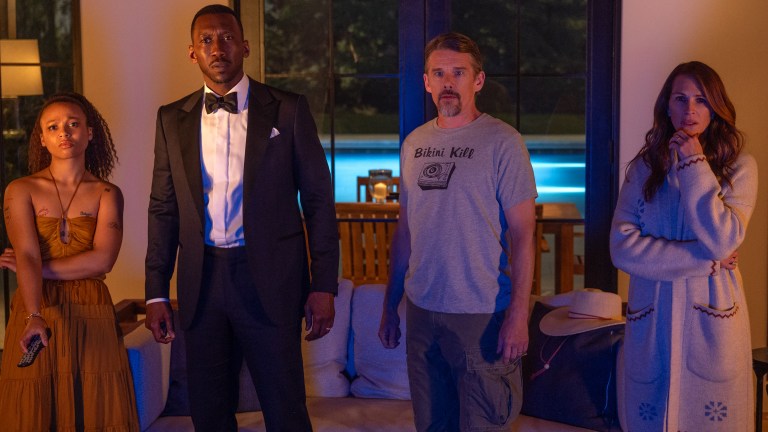Let’s Talk About the Leave the World Behind Ending
There is a lot to unpack in Netflix's film Leave the World Behind. We’ll have a go.

I’m a bit late to the party here, and this is an unusual article for me to be writing. I don’t like to use first person, see! But even though the film came to Netflix a couple of weeks ago I feel like we need to talk about Leave The World Behind and its ending. This isn’t an ‘ending explained’ as such, because I’m not completely sure I can fully explain everything. Instead I think we should talk about it, and I invite you to join me in the comments with your explanations.
Here’s what I made of the film and its closing moments.
Leave the World Behind sees a misanthropic woman and her laissez-faire husband face disasters they are absolutely unprepared for via a massive cyber attack. It’s got a super starry cast, including Julia Roberts, Ethan Hawke, Mahershala Ali and Kevin Bacon, it’s based on a critically acclaimed novel by Rumaan Alam, and it’s directed by Mr Robot creator Sam Esmail. Big setpieces including planes falling from the sky add scale and gravitas leaving the movie straddling personal domestic horror and global disaster film.
However, this is not an apocalypse movie, or a post-apocalypse movie, it’s a pre-apocalypse movie.
It also seems to be a film about grown ups who in one way or another are low-level awful. Vocalized most often by Julia Roberts’ character Amanda Sandford, who theorizes that people are terrible to each other, the adults aren’t evil, they’re aren’t even particularly malicious, they are just a bit shit in a very human way.
Amanda, her husband Clay (Ethan Hawke) and their two kids Archie (Charlie Evans) and Rose (Farrah Mackenzie) are vacationing in Long Island when a tanker crashes onto the beach. The phones are down, the internet is out and later in the night the Sandfords get a knock at the door from a man called George (Mahershala Ali) and his daughter Ruth (Myha’la) who claim to be the owners of the home where the Sandfords are staying. Afraid to return to the city due to a black out, they ask to stay at the house, which Amanda is initially resistant to. Suspicious of George, Amanda is prickly and rude, while Clay is lazily friendly. As the situation grows worse, tensions and loyalties in the house shift. Amanda and George grow close and contemplate cheating on their spouses despite George’s wife being due to fly back while planes are dropping from the sky, and is therefore probably dead. Clay ignores and abandons a desperate Spanish woman he passes on the road, while he is completely lost without GPS. Ruth antagonizes Amanda and does not want to help the Sandfords, and the Sandford’s son Archie secretly takes pictures of Ruth in her bikini without her permission.
13-year-old Rose is the exception here and she’s the only character in the film that carries any kind of redemptive hope for the world
The ending
Rose just wants to watch the last episode of Friends. It’s “nostalgia for a time that never existed,” claims Ruth, but somehow Rose (who would not have been born when the show aired) is deeply drawn to it. Rose doesn’t notice the bits that haven’t aged well, as Ruth does.
Rose tells her brother she thinks that no one cares what she says. “You’re probably right,” her brother replies. She probably is. While the grown ups are bickering, drinking, smoking weed and flirting Rose is noticing things the others do not. She sees the deer, and says they are warning them. She sees the flamingos and knows things aren’t right.
Rose tells a joke about a religious man who refuses to evacuate during a massive storm despite warnings and offers of help via boat and helicopter, who dies and asks God why he didn’t help him. God points out that he’d sent the warnings, the boat and the helicopter.
Rose says she is tired of waiting – and I think she’s tired of waiting for the ineffectual grown ups to rescue her when they have made no progress thus far. Instead Rose turns away from failed digital technology, and in the direction of nature. She takes her bike (mechanical) and rides in the direction of the deer. While the grown ups are unable to find her, and while her brother’s teeth are falling out (possibly from lyme disease, caused by the tick bite, possibly from some sort of sonic radiation), Rose has found the house with the bunker that doomsday prepper Danny (Kevin Bacon), has suggested they try to find.
When Rose gets there she eats a bunch of snacks, checks out the amazing array of physical media and then puts on the DVD of the last episode of Friends, which she’s been hankering for.
It’s worth noting that in the book Rose gets a load of supplies from the house and takes them back to George’s house. In the film though, we get the strong feeling Rose has no desire to go back to the others in any kind of hurry.
What happens next?
It isn’t clear but it is likely that the others will find the bunker and move in there since it is much better equipped and stocked than George’s house. The final scenes are an absolute love letter to physical media – the joy of owning and displaying stuff, of books, magazines, DVDs, board games. The scene where Rose hovers over the Netflix button on the remote and then hits play on the DVD was a deliberate comedy dig at Netflix (according to Sam Esmail on the Script Apart podcast). It’s a Netflix movie that is essentially saying that when the shit goes down, streaming won’t be worth a bean.
But nothing happens at the end, I was expecting the apocalypse!
Anecdotally it seems like some people are disappointed by an ending that they see as anti-climactic. We don’t see massive explosions, the world doesn’t end and nothing specific actually even happens to any of the main characters (with the exception of Archie and his poor teeth, but that could still have just been a tick).
Disappointing or otherwise, there’s an internal logic. We don’t know if whole cities, or indeed countries, have fallen. We don’t know, because we are so reliant on digital media for information now that once the tech has failed we are completely in the dark. We, the audience, don’t know, because the two families in question don’t know. It’s a terrifying but low key look at what it might realistically actually be like and a cautionary tale about becoming so reliant on tech that we are absolutely useless without it.
Clay is the absolute epitome of this and his character has a lot to say about privilege. Clay on paper is a nice friendly guy. But that’s because he has that luxury. Throughout, it is very clear that Amanda does all the heavy lifting in the house and for the family. Indeed at the start we see that she’s booked the holiday at 3 in the morning so that they actually end up doing it. He’s very happy to invite George in and share a drink with him with the kids upstairs. It’s Amanda who comes across as the bad guy because she is distrustful and worried about her children. Ruth points out that Clay seems like the kind of guy to whom things come easily. Hawke portrays this brilliantly. He’s the nice looking white man with a scruffy beard and a band t-shirt. He teaches media studies (very much not a coincidence in the context of the film). Ruth asks if he’s ever slept with a student. He says no but you do wonder…
Ruth on the other hand is a young woman of color of an age to be very tapped in and mindful of concepts of privilege. She is privileged in terms of wealth but she suspects Amanda’s rudeness is in part to do with their race. Is it or not? We can’t know for sure but the perception is there. She’s also aware of her youthfulness and beauty, she clocks Archie taking pics of her and suspects Clay wants to sleep with her. That super awareness is something Clay never has to have, whereas young women must. He can just let a stranger into his house to share a cocktail. The women can’t be as careless. And so Ruth doesn’t really want to help the Sandfords. Her seemingly benevolent father does, and on the face of it he’s kind (and he is) but it’s worth noting that he has a gun in the house and pulls it on Danny when he perceives it necessary. He’s wealthy and has things to protect, but you suspect that Clay doesn’t have a gun in his house.
What do the deer mean?
Hundreds of deer appear in the back garden of George’s house. Rose notices them first and pays attention, while Archie keeps missing them. Towards the end of the film Amanda and Ruth encounter the deer and perceive them to be a threat. Amanda starts shouting and waving her arms at them and eventually Ruth joins her. The two manage to scare the deer off. It’s a bonding moment between the two of them but what could be seen as hopeful and a show of solidarity between the women is also perhaps a rejection of nature. Had they followed the deer they’d probably have found Rose. This scene is parallelled with the men – George, Clay and a very sick Archie approaching Danny’s house and the altercation with the gun.
There might be something to be said about the masculine and feminine approaches to danger here but I’m not 100% sure what.
There does seem to be juxtapositions of nature versus technology. When the flamingos land in the pool and are frightened into flight we see an amazing shot of the flamingos against the sky with the backdrop across the water of New York exploding and on fire. The natural world will survive seems to be the message.
What do you make of the deer? Let us know in the comments.
A universal reset
The end of the movie seems to suggest a reset back to the 90s. Tech wasn’t invented in the 90s (obviously) and the internet did exist then (a bit) but mobile phones were rare, everyone didn’t have laptops and streaming services hadn’t yet sprung forth. Nostalgia for a time that didn’t exist is how Ruth sees Friends (which ran from 1994 – 2004), but perhaps this idealized version of a pre-online era could be a reality for someone like Rose, who didn’t live through it the first time. Perhaps Rose who has shown an interest in nature, ’90s shows and physical media could be a hope for a future – a future which resets the world to a ‘90s-like state where people read the papers to get their news, watch DVDs, read books, browse magazines and kids enjoy riding their bikes in the open air.
So although in the Leave the World Behind universe millions of people will have been killed, almost certainly including George’s wife, there’s a sort of satisfied hopefulness to it.
What did you make of it? Let us know below.
